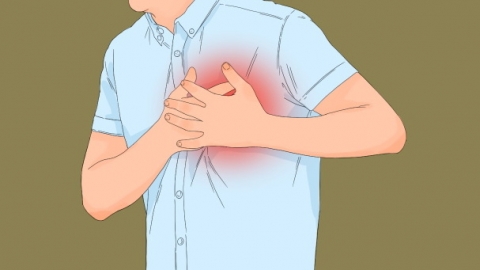What medications can relieve chest pain?
Generally, the main causes of chest pain include overexertion, emotional excitement, costochondritis, gastroesophageal reflux disease (GERD), and coronary atherosclerotic heart disease. Patients can choose medications such as ibuprofen sustained-release capsules, nitroglycerin tablets, and omeprazole enteric-coated capsules to improve symptoms. Detailed explanations are as follows:
1. Overexertion
Long-term high-intensity work or strenuous exercise can keep chest muscles in a constant state of tension, leading to lactic acid buildup and chest pain. It is important to reduce workload, avoid vigorous exercise, ensure adequate rest, and, under a doctor's guidance, take medications such as ibuprofen sustained-release capsules, diclofenac sodium sustained-release tablets, or acetaminophen tablets to relieve muscle pain.
2. Emotional Excitement
Sudden intense emotions such as anger or anxiety can cause sympathetic nervous system activation, increasing heart rate and constricting blood vessels, which may lead to chest pain. Emotions can be calmed through deep breathing, listening to soothing music, etc., and under a doctor's guidance, medications such as oryzanol tablets, vitamin B1 tablets, or lorazepam tablets may be taken to regulate nerve function and alleviate discomfort.

3. Costochondritis
Inflammation of the costal cartilage due to viral infection, trauma, or other factors can lead to nonspecific inflammation, which irritates surrounding tissues and causes chest pain. Under a doctor's guidance, medications such as celecoxib capsules, naproxen sodium tablets, or cefixime dispersible tablets may be taken to reduce inflammation, relieve pain, prevent infection, and alleviate symptoms.
4. Gastroesophageal Reflux Disease (GERD)
Abnormal function of the lower esophageal sphincter allows stomach contents to flow back into the esophagus, irritating the esophageal mucosa and causing retrosternal pain, often mistaken for chest pain. Dietary adjustments should be made to avoid spicy or hot foods, and under a doctor's guidance, medications such as omeprazole enteric-coated capsules, rabeprazole sodium enteric-coated tablets, or domperidone tablets may be taken to suppress gastric acid secretion, enhance gastric motility, and reduce reflux.
5. Coronary Atherosclerotic Heart Disease
Coronary artery atherosclerosis leads to vascular narrowing or blockage, resulting in insufficient blood supply to the heart muscle and causing angina pectoris, which manifests as chest pain. Immediate rest and avoidance of physical activity are necessary. Under a doctor's guidance, medications such as nitroglycerin tablets, aspirin enteric-coated tablets, or atorvastatin calcium tablets should be taken to dilate blood vessels, inhibit platelet aggregation, regulate blood lipids, relieve chest pain, and prevent disease progression.
In daily life, it is important to reasonably schedule work and rest to avoid overexertion, learn to regulate emotions and maintain a calm mindset, maintain regular eating habits and avoid overeating, undergo regular cardiovascular checkups, and promptly detect and treat related diseases to maintain overall health.




